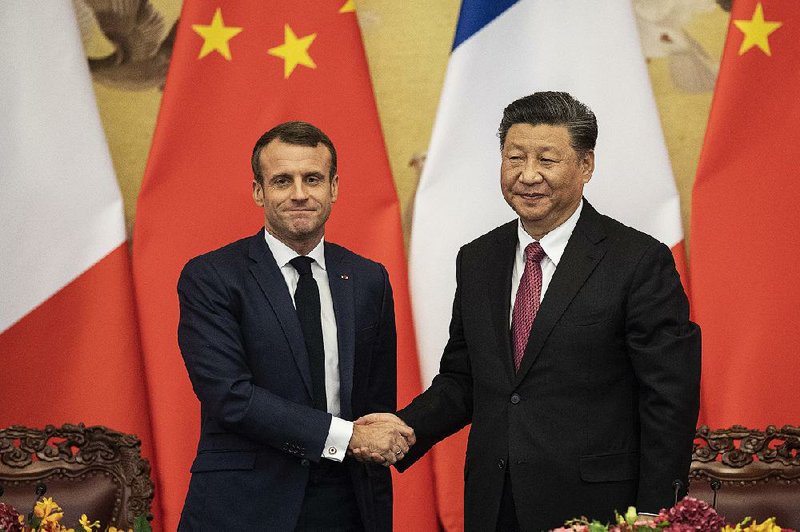PARIS -- President Emmanuel Macron of France tried to seize control of the issue of immigration Wednesday, as his government announced steps to make the country less attractive to migrants while cracking open the door to skilled foreign workers.
The combined moves were a bid by Macron to wrest the issue from his main political challengers, the far-right National Rally of Marine Le Pen, which for years has skillfully used immigration in its political ascent.
With municipal elections just months away, Macron has begun talking tough on immigration, especially on the perceived abuses of France's generous social welfare system, hoping to keep Le Pen's party, formerly known as the National Front, at bay.
Among Macron's new get-tough measures is a provision that asylum seekers would have to wait three months before qualifying for non-urgent health care.
In addition, officials said that informal migrant camps in and around Paris would be cleared by the end of the year, as the government confronts a growing and visible problem in many French cities.
But the government also announced that, starting next year, it would for the first time establish a system of annual quotas to grant visas to skilled migrants looking to enter France.
"We want to regain control over our immigration policy," Prime Minister Edouard Philippe said.
The measures drew immediate criticism from both the right, who said they didn't go far enough, and the left, who said Macron was unnecessarily endangering the already vulnerable population of asylum seekers for political ends.
In recent weeks, Macron -- who as a presidential candidate lauded Chancellor Angela Merkel of Germany for saving Europe's "collective dignity" through her pro-migrant policies during the height of the crisis in 2015 -- had been setting the stage for Wednesday's announcement.
In a long interview on the presidential plane with a right-wing magazine, Valeurs Actuelles, Macron recently said that authorities had been lax in expelling those who had entered France without authorization.
"My goal is to throw out everybody who has no reason to be here," he said.
In an interview on Radio France, Le Pen said that the government was addressing the issue of immigration simply because of the municipal elections, scheduled for March. She said the measures would be ineffective in reining in unauthorized immigration.
"They're talking about immigration because they think it's enough to talk about immigration to the French to make them believe that solutions are being brought," Le Pen said.
Nearly 124,000 people requested asylum in France last year, a record number and an increase of 23% from the previous year. The requests came mainly from Afghanistan, Syria, Sudan and France's former African colonies, but also from Albania and Georgia, two countries that France says respect human rights.
The increase in asylum seekers has exacerbated housing problems, overwhelming shelters established by the government.
The number of asylum seekers in France has risen, migrant support groups say, as part of the continuing effects of the migrant crisis.
According to the European Union law governing the process, known as the Dublin Regulation, applicants must request asylum in the first country they set foot in, and remain there. But many end up moving to a second country. Those who have gravitated to France are called "Dublines," in reference to the law.
Nations like Italy and Greece argue that the system presents an unfair burden on them. But France, Germany and others have stepped up efforts to send migrants back where they landed.
With countries unable or unwilling to rapidly process applications, migrants have been stuck in limbo for years, or end up wandering inside Europe, said Pierre Henry, the director of France Terre d'Asile, a migrants rights group.
"You have 200,000 to 250,000 people who are being sent back and forth in Europe like pingong balls," Henry said.
Macron's government has increasingly adopted arguments that some migrants are exploiting France's welcome of asylum seekers, who can quickly qualify for health care and other benefits.
His government has accused some asylum seekers of engaging in what it describes as "medical tourism" by seeking treatment for serious medical conditions in French hospitals.
Macron said that changes were necessary so that France "shouldn't be too attractive a country" for asylum seekers.
A Section on 11/07/2019
